The program
The Gerhard R. Andlinger Visiting Fellows program is designed to attract distinguished visitors, who will collaborate with Andlinger Center faculty, researchers, and students, and enrich the research and teaching at the Andlinger Center.
Practitioners from industry, government, and not-for-profit sectors will bring different perspectives and urgency to the energy and environmental challenges that are central to the center’s mission.
For more information, contact the Andlinger Center’s assistant director for research, Charlie Sharpless, at csharpless@princeton.edu.
Visiting Fellows
Tor Brostrom ’80
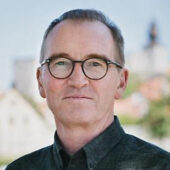 Tor Brostrom is a Swedish professor specializing in building conservation, currently at Uppsala University’s Department of Archaeology, Ancient History and Conservation on Campus Gotland. He earned his Bachelor of Science degree in engineering from Princeton (1980), a Teknologie Licentiat from Chalmers (1984), and a Ph.D. in energy engineering from KTH (1996), with his dissertation focused on moisture and heat modelling in church heating systems. His research centers on energy efficiency, indoor climate control, and climate adaptation in historic buildings, employing interdisciplinary and applied approaches to balance energy conservation with heritage preservation. Broström served as the scientific coordinator of Sweden’s national R&D program on energy efficiency in heritage buildings (2007–2024), co-led European standardization efforts (CEN EN16883), and held key roles in major international projects, including as scientific coordinator for the EU’s Climate for Culture and EFFESUS initiatives. Brostrom joins the Andlinger Center for Energy and the Environment as a Gerhard R. Andlinger Visiting Fellow in January 2026.
Tor Brostrom is a Swedish professor specializing in building conservation, currently at Uppsala University’s Department of Archaeology, Ancient History and Conservation on Campus Gotland. He earned his Bachelor of Science degree in engineering from Princeton (1980), a Teknologie Licentiat from Chalmers (1984), and a Ph.D. in energy engineering from KTH (1996), with his dissertation focused on moisture and heat modelling in church heating systems. His research centers on energy efficiency, indoor climate control, and climate adaptation in historic buildings, employing interdisciplinary and applied approaches to balance energy conservation with heritage preservation. Broström served as the scientific coordinator of Sweden’s national R&D program on energy efficiency in heritage buildings (2007–2024), co-led European standardization efforts (CEN EN16883), and held key roles in major international projects, including as scientific coordinator for the EU’s Climate for Culture and EFFESUS initiatives. Brostrom joins the Andlinger Center for Energy and the Environment as a Gerhard R. Andlinger Visiting Fellow in January 2026.
Sarah Glaven
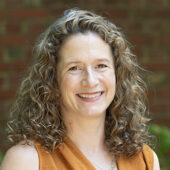 Sarah Glaven is a distinguished authority in biotechnology and biomanufacturing. She is a senior biologist at the United States Naval Research Laboratory where she has pioneered the field of electromicrobiology, the study of the interaction between microbes and electronic devices. She has published dozens of research articles cited thousands of times (>3700) and holds multiple patents. She has collaborated extensively with the private sector through cooperative research and development agreements and patent licensing.
Sarah Glaven is a distinguished authority in biotechnology and biomanufacturing. She is a senior biologist at the United States Naval Research Laboratory where she has pioneered the field of electromicrobiology, the study of the interaction between microbes and electronic devices. She has published dozens of research articles cited thousands of times (>3700) and holds multiple patents. She has collaborated extensively with the private sector through cooperative research and development agreements and patent licensing.
Glaven has played a pivotal role in modernizing biotechnology in the Department of Defense, receiving the first research award to collaborate with MIT to advance synthetic biology for ocean sensing, and later leading a team of researchers from the Navy, Army, and Air Force to further expand biotechnology for defense applications more broadly. Glaven then brought her expertise to the Pentagon to establish and lead the Tri-Service Biotechnology for a Resilient Supply Chain program, overseeing deployment of >$300 million to update laboratory infrastructure and create public-private partnerships to prototype and demonstrate biotechnology for defense. She has trained countless postdoctoral researchers and students, including the first iGEM team from the United States Naval Academy. In 2022, she served as Branch Chief of the Laboratory for Biosensors and Biomaterials where she supervised a staff of over 20 scientists and engineers. She is a fellow of the International Society for Microbial Electrochemistry and Technology and served as its President from 2018-2019.
Glaven recently served as Principal Assistant Director for Biotechnology and Biomanufacturing in the Office of Science and Technology Policy. She led the National Biotechnology and Biomanufacturing Initiative by establishing and chairing the National Bioeconomy Board. She oversaw coordination and implementation of over $15 billion in federal funding across the executive branch, including the Department of Defense, Department of Energy, Department of Health and Human Service, United State Department of Agriculture, and the National Science Foundation. She worked with the Science Advisor to the President and the National Security Council to advise the President on all areas of the bioeconomy, including research and development, data, infrastructure, procurement, workforce, regulation, biosafety and biosecurity, international engagement, and national security.
Non-resident Fellows
Rui Bo
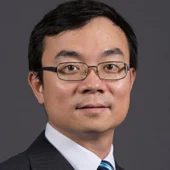 Rui Bo is an associate professor in electrical and computer engineering and affiliated faculty in economics at Missouri University of Science and Technology. He earned his BSEE and MSEE from Southeast University, China, and a Ph.D. from the University of Tennessee, Knoxville. His industry experience includes roles at ZTE, Shenzhen Cermate Technologies, and MISO, where he advanced from engineer to project manager before joining Missouri S&T in 2017. A Fellow of IET and Senior Member of IEEE, his research focuses on computation, optimization, and economics in power systems, high-performance computing, and electricity markets. He has published over 100 papers, serves as Associate Editor for multiple IEEE journals, and holds leadership roles in IEEE committees. Bo contributed to MATPOWER and the IEEE Power and Energy Technology Roadmap, and his honors include the NSF CAREER Award (2024), DARPA Young Faculty Award (2018), and numerous IEEE and institutional awards.
Rui Bo is an associate professor in electrical and computer engineering and affiliated faculty in economics at Missouri University of Science and Technology. He earned his BSEE and MSEE from Southeast University, China, and a Ph.D. from the University of Tennessee, Knoxville. His industry experience includes roles at ZTE, Shenzhen Cermate Technologies, and MISO, where he advanced from engineer to project manager before joining Missouri S&T in 2017. A Fellow of IET and Senior Member of IEEE, his research focuses on computation, optimization, and economics in power systems, high-performance computing, and electricity markets. He has published over 100 papers, serves as Associate Editor for multiple IEEE journals, and holds leadership roles in IEEE committees. Bo contributed to MATPOWER and the IEEE Power and Energy Technology Roadmap, and his honors include the NSF CAREER Award (2024), DARPA Young Faculty Award (2018), and numerous IEEE and institutional awards.
Angela M. Fasnacht
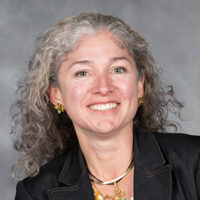 Angela Fasnacht, a veteran of the water utilities sector, joined the Andlinger Center in June 2023 as a Gerhard R. Andlinger Visiting Fellow to develop integrated solutions for decarbonizing the water sector and cleaning up pollutants. Fasnacht has collaborated with Peter Jaffé, the William L. Knapp ’47 Professor of Civil Engineering, to develop a course on decarbonization in the water sector that bridges the gap between researchers, operators, and policymakers. She also worked with Jaffé to organize a PFAS summit at Princeton identifying research priorities and other needs after recent action from the U.S. Environmental Protection Agency to address PFAS contamination. As a non-resident fellow, Fasnacht will work with Princeton faculty on forming a Water Research Hub built around joint research projects that will foster collaborations with leading water companies and seek to advance novel water management practices.
Angela Fasnacht, a veteran of the water utilities sector, joined the Andlinger Center in June 2023 as a Gerhard R. Andlinger Visiting Fellow to develop integrated solutions for decarbonizing the water sector and cleaning up pollutants. Fasnacht has collaborated with Peter Jaffé, the William L. Knapp ’47 Professor of Civil Engineering, to develop a course on decarbonization in the water sector that bridges the gap between researchers, operators, and policymakers. She also worked with Jaffé to organize a PFAS summit at Princeton identifying research priorities and other needs after recent action from the U.S. Environmental Protection Agency to address PFAS contamination. As a non-resident fellow, Fasnacht will work with Princeton faculty on forming a Water Research Hub built around joint research projects that will foster collaborations with leading water companies and seek to advance novel water management practices.
Katya Gratcheva
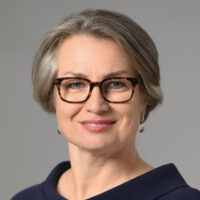 Ekaterina (Katya) Gratcheva joined the Andlinger Center in Fall 2023 as a non-resident fellow. She will work with Chris Greig to expand Rapid Switch, an international research initiative to identify and overcome the most critical bottlenecks to global decarbonization efforts. Gratcheva’s expertise in sustainable and development finance will extend the initiative’s country coverage to include mobilizing capital to help drive resilient, low-carbon infrastructure deployment in developing countries. As a non-resident fellow, she aims to build lasting partnerships between Princeton researchers, the financial industry, and multilateral and regional development banks to accelerate a just energy transition.
Ekaterina (Katya) Gratcheva joined the Andlinger Center in Fall 2023 as a non-resident fellow. She will work with Chris Greig to expand Rapid Switch, an international research initiative to identify and overcome the most critical bottlenecks to global decarbonization efforts. Gratcheva’s expertise in sustainable and development finance will extend the initiative’s country coverage to include mobilizing capital to help drive resilient, low-carbon infrastructure deployment in developing countries. As a non-resident fellow, she aims to build lasting partnerships between Princeton researchers, the financial industry, and multilateral and regional development banks to accelerate a just energy transition.
Anthony Ku
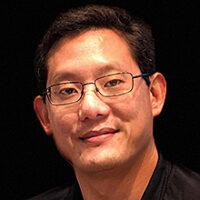 Anthony Ku is the founder and CEO of Clear Skies Hydrogen, which is developing systems for refueling heavy-duty vehicles with hydrogen. He serves as the Head of Advisory for Mercator Partners, where he leads the strategic analysis and technical diligence for clean tech investments, and he previously co-founded Xiron Global LTD, a consulting firm advising industry, government, and financiers on carbon management,. At the Andlinger Center, Ku is collaborating with researchers from the Energy Systems Analysis Group to study the challenges facing the nascent deployment of clean hydrogen production and carbon capture and storage. He is also collaborating with Jason Ren, professor of Civil and Environmental Engineering and the Andlinger Center for Energy and the Environment, bringing an industrial technology perspective to examine opportunities for using reclaimed wastewater for electrolytic production of hydrogen.
Anthony Ku is the founder and CEO of Clear Skies Hydrogen, which is developing systems for refueling heavy-duty vehicles with hydrogen. He serves as the Head of Advisory for Mercator Partners, where he leads the strategic analysis and technical diligence for clean tech investments, and he previously co-founded Xiron Global LTD, a consulting firm advising industry, government, and financiers on carbon management,. At the Andlinger Center, Ku is collaborating with researchers from the Energy Systems Analysis Group to study the challenges facing the nascent deployment of clean hydrogen production and carbon capture and storage. He is also collaborating with Jason Ren, professor of Civil and Environmental Engineering and the Andlinger Center for Energy and the Environment, bringing an industrial technology perspective to examine opportunities for using reclaimed wastewater for electrolytic production of hydrogen.
Tom Leyden ’77
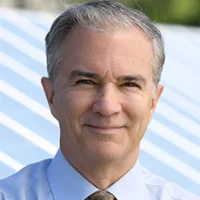 Tom Leyden brings over three decades of experience in leadership roles at a number of solar energy companies that span residential, commercial, and community solar development. During his non-resident fellowship, Leyden will organize events to help students learn about and prepare for careers in clean energy. As the founder and manager of the LinkedIn group Princeton in Solar & Cleantech, he will foster connections between alumni working in clean energy and students interested in entering the field. In addition to the Andlinger Center, he intends to work closely with the Keller Center to teach students about pathways to entrepreneurship in clean energy.
Tom Leyden brings over three decades of experience in leadership roles at a number of solar energy companies that span residential, commercial, and community solar development. During his non-resident fellowship, Leyden will organize events to help students learn about and prepare for careers in clean energy. As the founder and manager of the LinkedIn group Princeton in Solar & Cleantech, he will foster connections between alumni working in clean energy and students interested in entering the field. In addition to the Andlinger Center, he intends to work closely with the Keller Center to teach students about pathways to entrepreneurship in clean energy.
Richard H. Moss
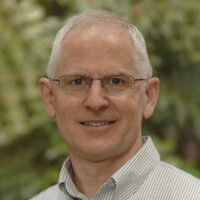 Richard H. Moss is a research scientist who focuses on improving society’s resilience and capacity for risk management of climate change. His research focuses on vulnerability and resilience, scenarios, uncertainty characterization, and multisector dynamics. Moss is currently a non-resident fellow at the Andlinger Center for Energy and the Environment and recently retired from Pacific Northwest National Laboratory’s Joint Global Change Research Institute. Among other positions, he served as Director of the U.S. Global Change Research Program. He has chaired or been a member of a number of advisory boards including the Federal Advisory Committee for the Sustained U.S. National Climate Assessment and the National Academy of Science, Engineering, and Medicine’s (NASEM) Board on Environmental Change and Society.
Richard H. Moss is a research scientist who focuses on improving society’s resilience and capacity for risk management of climate change. His research focuses on vulnerability and resilience, scenarios, uncertainty characterization, and multisector dynamics. Moss is currently a non-resident fellow at the Andlinger Center for Energy and the Environment and recently retired from Pacific Northwest National Laboratory’s Joint Global Change Research Institute. Among other positions, he served as Director of the U.S. Global Change Research Program. He has chaired or been a member of a number of advisory boards including the Federal Advisory Committee for the Sustained U.S. National Climate Assessment and the National Academy of Science, Engineering, and Medicine’s (NASEM) Board on Environmental Change and Society.
Moss directed the programming behind the 2020 E-ffiliates Retreat, which focused on resilience and making infrastructure and communities resilient to storms and other extreme disruptions.
Ange Nzihou
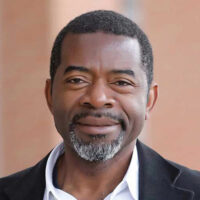 A pioneer in waste and biomass valorization, Ange Nzihou joined the Andlinger Center in March 2024 as a Gerhard R. Andlinger Visiting Fellow. Nzihou is a distinguished professor of chemical engineering at IMT Mines Albi – CNRS in France. As a fellow, Nzihou continued a collaboration with Claire White, associate professor of civil and environmental engineering and the Andlinger Center for Energy and the Environment, that began when he visited Princeton in 2022 through the Fulbright Visiting Scholar Program. The initial collaboration revealed the mechanism by which iron acts as a catalyst to turn waste biomass such as wood chips and cellulosic biomass into graphene, an advanced carbon material with many potential energy and environmental applications. The collaboration also grew to include additional Princeton faculty, such as Craig Arnold, to explore additional applications for waste valorization in the agriculture sector.
A pioneer in waste and biomass valorization, Ange Nzihou joined the Andlinger Center in March 2024 as a Gerhard R. Andlinger Visiting Fellow. Nzihou is a distinguished professor of chemical engineering at IMT Mines Albi – CNRS in France. As a fellow, Nzihou continued a collaboration with Claire White, associate professor of civil and environmental engineering and the Andlinger Center for Energy and the Environment, that began when he visited Princeton in 2022 through the Fulbright Visiting Scholar Program. The initial collaboration revealed the mechanism by which iron acts as a catalyst to turn waste biomass such as wood chips and cellulosic biomass into graphene, an advanced carbon material with many potential energy and environmental applications. The collaboration also grew to include additional Princeton faculty, such as Craig Arnold, to explore additional applications for waste valorization in the agriculture sector.
In December 2025, Nzihou was awarded the rank of Officer in the National Order of Merit, one of France’s highest national distinctions, by President Emmanuel Macron. A group of peers nominated Nzihou in a highly confidential process. The president’s office released a statement indicating that the selection was based on Nzihou’s “outstanding and enduring contributions to science for energy transition, as well as the impact of his research on industry and society.”
John Pickering
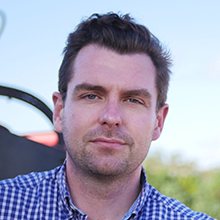 John Pickering, chief behavioral scientist, is the founder and chief executive officer of Evidn, LLC with extensive experience in the analysis, design, delivery and evaluation of behavior change programs for large scale complex problems. Pickering is the co-chair of the Nature Sustainability Expert Panel on Behavioral Science, Design and Sustainability, a member of the Organization for Economic Co-operation and Development (OECD) expert steering group on agri-environmental behavior economics, and was recently appointed to the Queensland Government’s Health and Wellbeing Advisory Board to oversee the development of behavioral change strategies for improving health outcomes across the state. Pickering has various scholarly positions at universities worldwide including an appointment at Princeton University (non-resident fellow), Darden Business School, University of Virginia (visiting scholar), and The University of Queensland (industry fellow). Pickering has published extensively in the areas of behavior change, psychology, sustainability and innovation, and is a regular commentator in state and national media outlets.
John Pickering, chief behavioral scientist, is the founder and chief executive officer of Evidn, LLC with extensive experience in the analysis, design, delivery and evaluation of behavior change programs for large scale complex problems. Pickering is the co-chair of the Nature Sustainability Expert Panel on Behavioral Science, Design and Sustainability, a member of the Organization for Economic Co-operation and Development (OECD) expert steering group on agri-environmental behavior economics, and was recently appointed to the Queensland Government’s Health and Wellbeing Advisory Board to oversee the development of behavioral change strategies for improving health outcomes across the state. Pickering has various scholarly positions at universities worldwide including an appointment at Princeton University (non-resident fellow), Darden Business School, University of Virginia (visiting scholar), and The University of Queensland (industry fellow). Pickering has published extensively in the areas of behavior change, psychology, sustainability and innovation, and is a regular commentator in state and national media outlets.
Sharon L. Walker
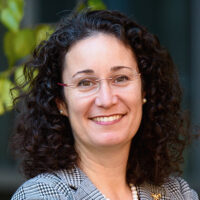 Sharon L. Walker, Ph.D., is Dean of Drexel Engineering and Distinguished Professor of Civil, Architectural and Environmental Engineering, as well as Executive Director of ELATES at Drexel, a national leadership development program committed to increasing the representation of women in STEM. She is also chair of the Engineering Deans Council of the American Society for Engineering Education (ASEE). Walker is principal investigator on the NSF Advance Grant, “Catalyzing STEM Gender Equity at Drexel: Building a Foundation for Systemic Transformation,” and in 2021 received the Winifred Burks-Houck Professional Leadership Award from the National Organization for the Professional Advancement of Black Chemists and Chemical Engineers. A Yale University-trained water quality systems expert focusing on the fate and transport of bacteria and nanoparticles in water, Walker is a fellow of AEESP, AAAS, and AIMBE. Walker has produced more than 250 conference papers and publications, and in 2018 won the AEESP inaugural Mary Ann Liebert Award for Publication Excellence in Environmental Engineering Science. She holds a Ph.D. in Environmental Engineering and an MS in Chemical Engineering, both from Yale, and earned two undergraduate engineering degrees in environmental engineering and environmental studies from the University of Southern California.
Sharon L. Walker, Ph.D., is Dean of Drexel Engineering and Distinguished Professor of Civil, Architectural and Environmental Engineering, as well as Executive Director of ELATES at Drexel, a national leadership development program committed to increasing the representation of women in STEM. She is also chair of the Engineering Deans Council of the American Society for Engineering Education (ASEE). Walker is principal investigator on the NSF Advance Grant, “Catalyzing STEM Gender Equity at Drexel: Building a Foundation for Systemic Transformation,” and in 2021 received the Winifred Burks-Houck Professional Leadership Award from the National Organization for the Professional Advancement of Black Chemists and Chemical Engineers. A Yale University-trained water quality systems expert focusing on the fate and transport of bacteria and nanoparticles in water, Walker is a fellow of AEESP, AAAS, and AIMBE. Walker has produced more than 250 conference papers and publications, and in 2018 won the AEESP inaugural Mary Ann Liebert Award for Publication Excellence in Environmental Engineering Science. She holds a Ph.D. in Environmental Engineering and an MS in Chemical Engineering, both from Yale, and earned two undergraduate engineering degrees in environmental engineering and environmental studies from the University of Southern California.
Harry A. Warren ’79
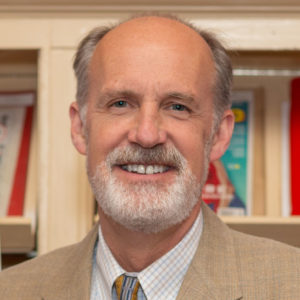 Harry A. Warren, Jr. is president of CleanGrid Advisors LLC, a renewable energy consulting firm focused on Mid-Atlantic markets. Warren is also a co-founder of the Center for Renewables Integration, a non-profit working to advance the deep penetration of renewable energy on the grid.
Harry A. Warren, Jr. is president of CleanGrid Advisors LLC, a renewable energy consulting firm focused on Mid-Atlantic markets. Warren is also a co-founder of the Center for Renewables Integration, a non-profit working to advance the deep penetration of renewable energy on the grid.
Warren was formerly executive vice president of Community Energy, Inc. where he was responsible for business planning on community solar, virtual net metering, and other retail customer access programs. Prior to joining Community Energy, Warren spent 17 years as president of Washington Gas Energy Services, Inc., a leading retail electricity and natural gas marketer in the mid-Atlantic region, and served in several positions at WGES’ utility affiliate, Washington Gas prior. Warren negotiated the corporation’s first solar PPAs in 2008 and 2009. Prior to joining Washington Gas, he worked in research, development and design of renewable energy systems. At the Andlinger Center, Warren studied how energy resources and building energy systems can be designed and operated to help meet the challenges power grids face from increasing percentages of variable, renewable energy supplies.
He holds a bachelor’s degree in mechanical engineering from Princeton University and a master’s degree in mechanical engineering from Stanford University.
During his time as a visiting fellow, Warren, a 1979 alumnus, curated a full-day conference aimed at facilitating conversation between diverse players within the energy industry, from renewable energy developers to utility regulators, in collaboration with Energy Dialogues LLC.
Former Fellows
Visiting Fellows in the News
- Former Princetonian returns as visiting fellow to study energy efficiency in historic buildingsTor Brostrom joins the Andlinger Center for Energy and the Environment as a Gerhard R. Andlinger Visiting Fellow in January 2026.
- Gerhard R. Andlinger Visiting Fellow to tackle stability issues in high-performance solar cellsMichael Saliba has joined the Andlinger Center as a Gerhard R. Andlinger Visiting Fellow to collaborate on improving the long-term stability and sustainability of high-performance perovskite solar cells and tandem ...
- KAIST and the Andlinger Center at Princeton University Announce Net-Zero Korea Study to Accelerate Korea’s Energy TransitionNet-Zero Korea will increase Korean capacity for energy-system transition modeling through collaboration between the Korea Advanced Institute of Science and Technology (KAIST) and the Andlinger Center for Energy and the ...
- Biotechnologist Sarah Glaven joins Andlinger Center as Gerhard R. Andlinger Visiting Fellow to scale sustainable biomanufacturingSarah Glaven has joined the Andlinger Center as a Gerhard R. Andlinger Visiting Fellow to chart a sustainable future for the biomanufacturing industry.
- Visiting fellow to study stability of renewables-heavy energy systemsPhilippe Jacquod has joined the Andlinger Center for Energy and the Environment as a Gerhard R. Andlinger Visiting Fellow, working to ensure the stability and reliability of the power system ...
- Visiting fellow to develop cooling coatings for solar devicesKlaus Jäger joined the Andlinger Center for Energy and the Environment in August as a Gerhard R. Andlinger Visiting Fellow.
- Experts from across sectors convene to discuss PFAS solutions at Andlinger Center summitOver 80 leaders from academia, industry, and the public sector gathered on Princeton’s campus to brainstorm solutions for combating PFAS contamination.
- Gerhard R. Andlinger Visiting Fellow engineers sustainable carbon materials for a greener futureChemical engineer Ange Nzihou has joined the Andlinger Center as a Gerhard R. Andlinger Visiting Fellow to research sustainable carbon materials.
- Tool for tracking climate progress finds fossil fuel producers come up shortA new framework allows stakeholders to track the climate progress of fossil fuel producers against multiple pathways consistent with the aims of the Paris Agreement.
- Gerhard R. Andlinger Visiting Fellow to triangulate water research, policy, and practiceAngela Fasnacht has joined the Andlinger Center as a Gerhard R. Andlinger Visiting Fellow, working to develop integrated solutions for decarbonizing the water sector and cleaning up pollutants.